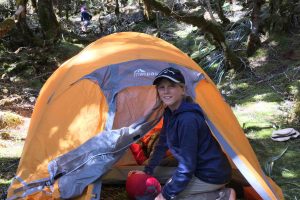KCC member Esther and her dad spent some time trying out our red cabbage indicator experiment. Here’s how they got on…
The purple colour is spectacular! But then the eventual colour of the paper is quite light, so when we were first looking at our water samples we had some doubt about whether or not we were seeing a change or just the paper getting wet.

We did this experiment on the Manawatu river and the Tiritea stream that flows through Massey University and Bledisloe Park. It was done over two days.
Although they were neutral, you can tell by looking at the pictures that the water isn’t clean. We took some samples of the water home and put it straight in the cabbage water to see if it was different. It wasn’t.

Esther taking a water sample from the Manawatu river
So we went back home with samples from both sources, and added some to some of the strongly-coloured cabbage water. And there was no noticeable change, leading us to conclude that water pH might not change very much even if there is pollution or that it would have to be a really big change in pH to be noticeable using red cabbage.
To double-check it was working, we also tested some baking soda (bright blue in the cabbage!) and white vinegar (bright pink/red!) so we knew our cabbage was great, and our water samples were fairly neutral.

This was lots of fun, thanks! And we had lots of interesting conversations about what we were doing and why, and about the quality of the water in our part of New Zealand. Thanks for this, we felt like real scientists!
There are lots of tests that scientists need to do to know how polluted the water really is. Testing the pH is only one of them, but it’s a great way to do your own experiment to test the water around where you live. Have a go and tell us what you found out.
For more information on water testing and what else you can look for go to www.waicare.org.nz
Test the items below. Have a guess first as to whether it is an acid or an alkaline (base) and then compare the colour with the chart to find the pH. Were you right?








